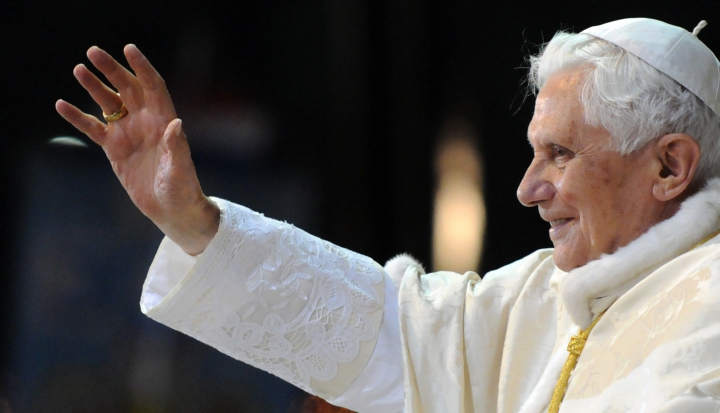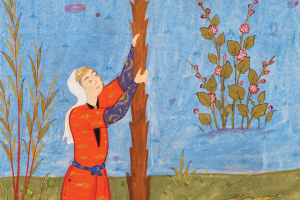Pope Benedict XVI will leave behind an enduring legacy—and some big challenges for his successor.
A great grace of my life was to study theology in Rome during the four sessions of the Second Vatican Council. A further grace was being present in St. Peter’s Square last October to celebrate the 50th anniversary of the council’s opening. In the presence of the patriarch of Constantinople, the archbishop of Canterbury, the bishops attending the Synod on Evangelization, and thousands of others who crowded into the square, Pope Benedict XVI preached a homily celebrating the council’s achievements and initiating the Year of Faith.
In his homily the pope praised the documents of the council as the indispensable basis upon which to build as we confront the challenges of the present and the future. He stated this conviction: “Reference to the documents saves us from extremes of anachronistic nostalgia and running too far ahead, and allows what is new to be welcomed in a context of continuity.” Hence, he refused to separate the “spirit” of the council from the actual texts that embody that spirit.
But Benedict also stated his conviction that the true legacy of the council can only be realized if one fully appreciates its evangelical thrust. Though dialogue with the world is crucial, the council issued a clear call to evangelization. “I believe that the most important thing, especially on such a significant occasion as this, is to revive in the whole church . . . that yearning to announce Christ again to contemporary men and women.”
Vatican II itself is the origin of the impulse to a new evangelization. Vatican II has been the lodestar of Joseph Ratzinger’s theological and pastoral reflections, from his participation at the council as a young theologian through his almost eight-year exercise of the papal ministry. This claim may seem strange to those who associate him with a retrenchment from the advances of the council. But, as his homily on the 50th anniversary indicates, his overriding concern has been that the new advances proceed in continuity with the church’s tradition.
As he stated on another occasion: We must interpret the council in terms both of reform and fundamental continuity. The foundation of both reform and continuity is Jesus Christ himself.
Though Benedict is the successor of St. Peter, he evokes for me another New Testament figure: John the Baptist. Like the Baptist, he understood his mission to point to Jesus: “He must increase, while I must decrease.” Perhaps this proclamation was never so strikingly evident as in Benedict’s historic decision to resign his office. The pope’s primacy in the church is his faithful testimony to the one who is the only light of the nations.
Christ above all
Thus the great legacy Pope Benedict leaves the church he loves is his personal witness to the primacy of Jesus Christ and his meditative writings on the Lord, who is the “pearl of great price.”
Vatican II did not compose a separate document treating Christology, the teaching about the person and saving work of Jesus Christ. But its proclamation of Jesus permeates all the council’s documents. Therein lies one of the distinguishing characteristics of the council’s content and style: It does not teach new things about Jesus. It teaches Jesus in a new way, a way that is more biblical, more evangelical, more experiential.
Joseph Ratzinger, as a young theologian, contributed to this new approach; and he brought this passion to his theological and pastoral teaching as pope.
From the very beginning of his papacy, Benedict announced joyfully that Christianity is not an idea, however sublime, or a moral code, however enlightened, but an encounter: a personal encounter with the person of Jesus Christ. This Jesus Christ is not a figure from the past to whom the church makes perfunctory reference, but rather the living Lord who is the very source of the church’s life. Christians live, move, and have their being in the body whose head is Christ.
Benedict’s passion for Christ infused the homilies he preached. Many know-ledgeable scholars say that his homilies represent the finest papal homilies since figures like Leo the Great and Gregory the Great. They are accessible to all by the depth of their insight and the vividness of their imagery. They point evocatively beyond themselves to the inexhaustible mystery of Christ. These homilies will nourish the people of God for years (indeed, God willing, for centuries) to come.
Along with his homilies, Benedict’s books on Jesus will remain a permanent part of his legacy. Writing them was a unique undertaking for a pope. They are far more than an academic exercise and are animated by deep pastoral concern.
Benedict gives voice to this concern in a poignant way in the foreword to the first volume of Jesus of Nazareth: From the Baptism in the Jordan to the Transfiguration (Ignatius Press). He laments that some contemporary approaches to the New Testament have raised doubts in people’s minds regarding the reliability of our knowledge of Jesus. He recognizes the peril this poses and admits, “This is a dramatic situation for faith because its point of reference is being placed in doubt. Intimate friendship with Jesus, on which everything depends, is in danger of clutching at thin air.”
Like Luke in the prologue to his gospel, Benedict writes so that Christians “may know the truth concerning the things which they have been taught.”
Friendship with Jesus is at stake, and this is Benedict’s abiding concern. Friendship with the Lord is at the heart of his prayer life and animates his ministry. Ultimately, it guided his discernment to relinquish the papacy.
Joseph Ratzinger took the name Benedict partly in homage to the great saint and father of Western monasticism. A crucial injunction in St. Benedict’s Rule is: “Prefer nothing to Christ” and “Cherish Christ above all.” Pope Benedict has always sought to honor the saint’s command. In his retirement, his “hidden life” of prayer and meditation, he will continue to do so.
Faith and reason
In his third encyclical, Caritas in Veritate (2009), on the church’s social teaching, Pope Benedict developed the notion of integral humanism. He borrows the phrase from 20th-century French Catholic philosopher Jacques Maritain, but the reality to which it points is central to the Catholic tradition.
At its most basic level, integral humanism advocates and supports the compatibility and mutual enrichment of faith and reason. No dimension of human experience lies outside the concern and compass of faith, and faith can be enriched by whatever is true and good in human culture and achievement.
Further, integral humanism suggests that we must consider the human person as a whole in all the dimensions of human activity. This ecologically minded pope teaches that our concern for the environment must be matched by a concern for human ecology: the well-being of humankind in the physical, political, and economic orders. He writes in Caritas in Veritate, “The deterioration of nature is, in fact, closely connected to the culture that shapes human coexistence: When ‘human ecology’ is respected within society, environmental ecology also benefits.”
It is noteworthy that—although Benedict is, by all accounts, a reserved and even shy person—he has become one of the world’s outstanding public figures. Among his lasting achievements one must count his appearances in the public forum of secular bodies like the British Parliament and the German Bundestag. To the assembled parliamentarians and academic and cultural leaders in London, the pope said: “The world of reason and the world of faith—the world of secular rationality and the world of religious belief—need one another and should not be afraid to enter into a profound and ongoing dialogue for the good of civilization.”
He reminded the German legislators that “the conviction that there is a Creator God is what gave rise to the idea of human rights, the idea of the equality of all people under the law, the recognition of the inviolability of human dignity in every single person, and the awareness of people’s responsibility for their actions.”
Benedict’s thoughts have always been closely dependent on concrete figures who serve him as role models and continuing inspiration.
Certainly, his engagement with St. Augustine (354-430 A.D.) is longstanding. He identifies with the sense of yearning and of ongoing quest in the North African church father’s life and writings. He also learned as a young student from the English Cardinal John Henry Newman that faith has nothing to fear from reason and that reason is expanded by faith. Benedict had the great joy of beatifying Newman during his 2010 visit to England.
More recently, last October, he proclaimed Hildegard of Bingen a doctor of the church. This remarkable 12th-century German woman brought together in a creative synthesis philosophy and theology, mysticism, medicine, and music, and she represents the best of the Catholic intellectual tradition.
For Benedict, ideas are always the still-living thoughts of concrete persons. He gladly echoes the words of the great Lutheran-turned-Orthodox historian of doctrine, Jaroslav Pelikan: Tradition is the living faith of those who have gone before us.
Famous faux pas
Honest discernment also needs to confront missteps in Benedict’s exercise of the papal office.
The first misstep occurred during his Regensburg Address of September 2006 on “Faith, Reason, and the University.” The address itself presents a careful consideration of the topics of faith and reason and their relation to religion—a reflection that retains all its importance and validity. Unfortunately, the message was overshadowed by the furor arising from the pope’s quotation of a medieval Byzantine emperor in a way deemed detrimental to Islam. These brief opening remarks sadly provoked the very violence against which the pope had cautioned.
Though Benedict quickly distanced himself from an association with the sentiments expressed by the ancient ruler, the unfortunate quote seemed to reveal his less than adroit perception of the impact of certain ways of expressing himself. Having admitted that, the papal blunder was endlessly replayed, even as the pope repaired relations with Muslims through historic visits to Jordan, Turkey, and Lebanon. Indeed the trip to Lebanon, in September 2012, was not only an act of ecumenical importance, it was one of great personal courage, coming as it did in the course of the tragic conflict in neighboring Syria. Yet that trip received scarce coverage by the secular media.
A second misjudgment, in my view, is his lack of sufficient attention and discrimination in the area of institutional management. Although the church is far more than an institution, Catholic doctrine concerning the church insists that it has a necessary institutional dimension. Here Benedict’s intellectual and spiritual gifts appear not to have served him well. His secretary of state, Italian Cardinal Tarcisio Bertone, also did not demonstrate the organizational and diplomatic skills necessary to manage the Vatican bureaucracy successfully.
A particularly harmful failure on the part of the Vatican secretariat of state was not being aware of the Holocaust-denying views of a bishop from the ultra-conservative Society of St. Pius X. The failure to caution the pope about this fact transformed a generous act—the lifting of excommunication for the sake of ecclesial unity—into a public relations disaster.
A third contentious and especially delicate issue is the continuing response to the sexual abuse of minors on the part of priests and religious. Supporters of the pope hold that he has initiated important steps in coming to grips with this blight on the church. In 2005, during Good Friday stations of the cross at the Colosseum, Ratzinger, still a cardinal at the time, famously lamented “filth” in the church. As pope, he removed the founder of the Legion of Christ, Father Marcial Maciel Degollado, and consigned him to a life of penance for his sexual transgressions.
He has also on several occasions during his voyages met with victims of clergy sex abuse. Significantly, he has clarified and strengthened the authority of the Congregation for the Doctrine of the Faith in matters related to clergy abuse of minors, this open wound in the body of Christ.
The pope’s critics complain that he has not held bishops sufficiently accountable for their poor decisions that permitted such abuse to continue. They also suggest that, when prefect of the Congregation for the Doctrine of the Faith, Cardinal Ratzinger failed to make clear the obligation of bishops and superiors to inform civil authorities of crimes committed.
Whatever one’s assessment of the pope’s response to this terrible stain on the church and its priesthood, one can certainly affirm the words he addressed in a March 2010 pastoral letter to the Catholics of Ireland: “It must be admitted that grave errors of judgment were made and failures of leadership occurred. All this has seriously undermined your credibility and effectiveness. . . . Besides fully implementing the norms of canon law in addressing cases of child abuse, continue to cooperate with the civil authorities in their area of competence.”
However, even here, critics note a reluctance to acknowledge that the Vatican too bears its share of responsibility and has suffered its own loss of credibility.
Unfinished business
Pope Benedict’s resignation has, in a very concrete way, enabled Catholics to distinguish more clearly the Petrine office and its officeholder, however gifted or charismatic he may be. It thus has given greater freedom to his successor to place his gifts generously at the service of Christ and his church while recognizing that his office transcends his person.
The new bishop of Rome will need to direct his wisdom and energies to address pressing challenges. I suggest some, but the list can easily be amplified or extended.
He will need to promote the continuing purification of the church in the wake of the sex abuse scandal. Much of this must, of course, take place at the local diocesan level. His leadership by word and deed will be crucial. Intimately connected with this is the expansion of effective accountability of bishops.
He must continue a respectful dialogue with the world religions, and in particular with Islam. At the same time there remains an urgent need to condemn forcefully the growing violence directed against Christians, especially in parts of Africa, India, and Pakistan.
The new pope will need to take seriously the dysfunctional nature of some of the Vatican bureaucracy: the lack of basic communication and real collaboration. Therefore he will have to choose wise and competent coworkers. One perceives here a real opportunity to move imaginatively beyond the clerical confines of the Vatican to draw upon the dedication and diverse gifts of laywomen and men.
The pope is one of the world’s most-watched communicators—his every word and gesture closely scrutinized. Thus communication skills in this age of social media are indispensable, though each person will undoubtedly bring his own particular style and skills to the demanding task.
Above all, however, the pope’s ministry lies in bearing witness to the radical newness of Jesus Christ, crucified and risen. He must bring forth from the riches of tradition the new and the old with faith, insight, and imagination. An important task facing the new pope will be to gather the conclusions of the recent synod of bishops on the New Evangelization and craft a document that can offer guidance for this crucial responsibility of the church. Evangelization is not one among many things the church does. It stands at the heart of what the church—and the pope—is about: proclaiming joyfully the good news of Jesus Christ.
Vatican II challenged all Catholics to a renewed realization of their baptismal dignity. But that dignity is inseparable from a corresponding responsibility. Therefore the council issued a universal call to holiness and a universal call to evangelization. Living the gospel and sharing the gospel constitute the very rhythm of our life in Christ. The needed reform of church structures is but a means to this end: that they may better serve our faithful and joyful witness to Christ.
This article appeared in the April 2013 issue of U.S. Catholic (Vol. 78, No. 4, pages 12-17).
Image: Flickr photo cc by M.Mazur/www.thepapalvis












Add comment